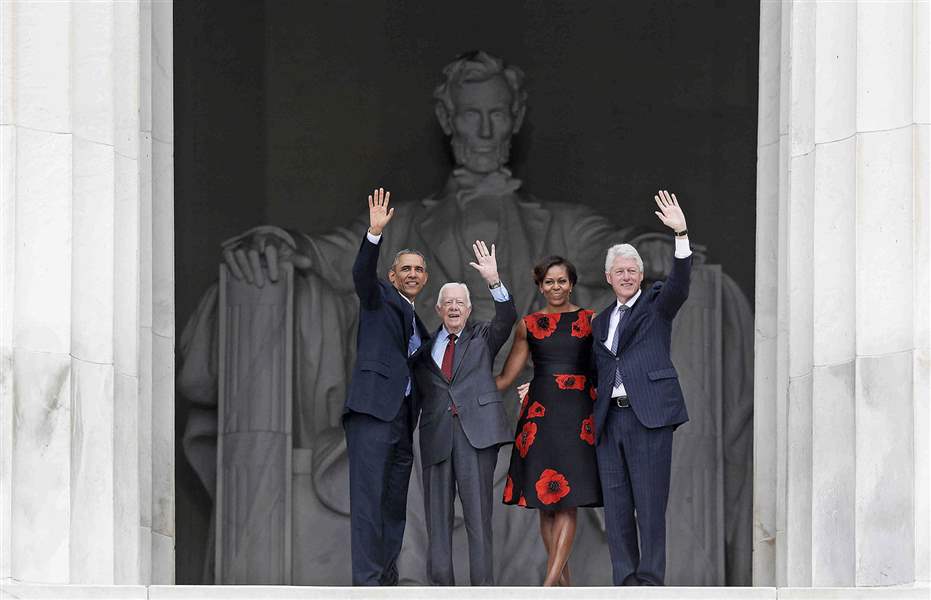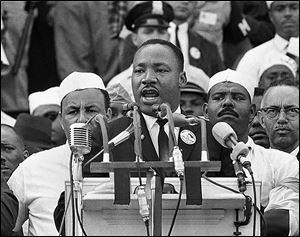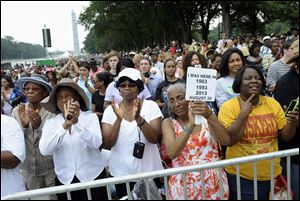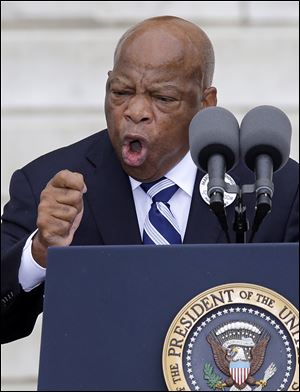
March’s current of change won’t end, Obama predicts
President, others honor King’s speech 50 years later
8/29/2013
President Obama, former President Jimmy Carter, First Lady Michelle Obama, and former President Bill Clinton acknowledge the crowds as they leave the 50th Anniversary of the March on Washington. Mr. Obama’s speech invoked lofty rhetoric while Mr. Carter and Mr. Clinton discussed policy initiatives.
ASSOCIATED PRESS

President Obama, former President Jimmy Carter, First Lady Michelle Obama, and former President Bill Clinton acknowledge the crowds as they leave the 50th Anniversary of the March on Washington. Mr. Obama’s speech invoked lofty rhetoric while Mr. Carter and Mr. Clinton discussed policy initiatives.
WASHINGTON — Expectations were high for President Obama on Wednesday as he stood on the steps of the Lincoln Memorial to honor a man who electrified the nation and fueled the civil rights movement with a famous speech made 50 years ago from the same spot.
Read about the local march by UT students
Dream Lives on for generations
Photo gallery: U.S. ceremonies remember the March on Washington for Jobs and Freedom
Photo Gallery: See pictures from The Blade's archives, from Sept. 1967, of the Rev. Martin Luther King, jr.'s one trip to Toledo.
The country’s first black President held himself up as a symbol of the dream that Martin Luther King, Jr., talked about that day, but also pointed to economic hardships that have hit minority communities hardest.
He left policy talk to former Presidents Bill Clinton and Jimmy Carter who spoke before him, advocating for implementation of health-care reform and improvements to voter rights.
Rather, Mr. Obama used sweeping rhetoric and lofty prose to laud the fathers of the civil rights movement and the progress that’s been made in the 50 years since the March on Washington, sandwiched between the murder of Emmett Till, the arrest of Freedom Riders, and the assassination of Mr. King.
“Through setbacks and heartbreaks and gnawing doubt,” civil rights leaders kept marching, Mr. Obama said.
“And because they kept marching, America changed. Because they marched, a civil rights law was passed. Because they marched, a voting rights law was signed. Because they marched, doors of opportunity swung open so their daughters and sons could finally imagine a life for themselves beyond washing somebody else’s laundry or shining somebody else’s shoes,” he said.
“Because they marched, city councils changed and state legislatures changed, and Congress changed and, yes, eventually the White House changed,” he said to a crowd that cheered back, “O-ba-ma! O-ba-ma!”
Anyone who dismisses the magnitude of the change dishonors the sacrifices of the fathers of the civil rights movement, he said.
“But we would dishonor those heroes as well to suggest that the work of this nation is somehow complete,” he said. Progress requires vigilance, and there will be setbacks, but the current of change won’t be stopped, he said.

The Rev. Martin Luther King, Jr., energizes hundreds of thousands with his ‘I Have A Dream’ speech on the National Mall in Washington on Aug. 28, 1963.
Earlier, Mr. Carter praised Mr. King’s work to help all of America.
“Too many people think Martin Luther King freed only black people. He freed all people,” Mr. Carter said.
Mr. Clinton, meanwhile, recalled watching the speech on television as a 17-year-old in Arkansas. “This speech changed America. It moved millions,” he said.
Oprah Winfrey, who was among several celebrity speakers, also remembered the 1963 march. She was 9 and wished she could have been there to see a man “who was able to force an entire country to wake up, to look at itself, and to eventually change.”
Several politicians also spoke, including Rep. Marcia Fudge (D., Ohio), chairman of the Congressional Black Caucus.
“[Mr.] King dreamed of an American where every individual — no matter what their race, nationality, or socioeconomic background — would have the opportunity to achieve dreams of their own,” she said. “His dream was a call to action.”
That hasn’t worked out so well for Mary Ann Blackman. She attended the 1963 rally with her brother, but spent the 50th anniversary a mile away begging for coins at Foggy Bottom Metro Station so she could buy lunch.
Usually she stays in a nearby homeless shelter, but this week the shelter was full so she spent two nights on the street in front of a fire station where she slept in her wheelchair with her legs elevated on a milk crate and a cardboard box.

Three women who attended previous Marches on Washington, from left, Armanda Hawkins of Memphis, Vera Moore of Washington, and Betty Waller Gray of Richmond, Va., with sign, listen to speakers.
For her, the dream won’t be achieved until homelessness is eradicated, poverty is eliminated, and health care is affordable for all. Still, there’s been progress because of Mr. King and other civil rights leaders of the 1960s, said Ms. Blackman, who can remember as a child being shooed out of a store by an owner who called her “Negro” and worse.
“Over the years it’s gotten better, but at this particular point in my life it’s gotten worse for me,” Ms. Blackman said outside the metro station.“Now I’ve got to ask people — in the name of Jesus — for money on the street.”
Meanwhile, on the National Mall, the President told the crowd that economic disparity is hurting families and that upward mobility has become harder.
The mark of progress isn’t whether “the doors of opportunity are cracked a bit wider for a few, [but] whether our economic system provides a fair shot for the many — for the black custodian and the white steelworker, the immigrant dishwasher and the Native American veteran,” he said. “To win that battle — to answer that call — this remains our great unfinished business.”
In Philadelphia, Drexel University law professor Donald Tibbs, whose specialties include race and civil rights, said the President was under a lot of pressure because his address commemorated one of the greatest speeches in American history.
“He delivered. His speech was magnanimous, and he talked about economic disparity,” which was appropriate because the 1963 march focused on joblessness as well as racial inequality,” Mr. Tibbs said. “I think the President did an excellent job of delivering the message that we still have a dream and that dream, that hope, is something that all Americans can connect to.”
Homewood, Pa., native Linda Perkins, 67, agreed. She waited in drizzling rain for five hours to hear Mr. Obama.
The President “captured for all of the things we needed to hear about economic conditions and the ability of people to move up,” said Ms. Perkins, now of Washington. “It’s the unfinished business of the march.”
Other speakers included Mr. King’s children, National Action Network founder Al Sharpton, former first daughters Caroline Kennedy and Lynda Bird Johnson, and actors Forest Whitaker and Jamie Foxx.
Each looked out over the National Mall, where skin tones were as varied as the colors of the countless umbrellas. People stood shoulder to shoulder and swayed to the music of LeAnn Rimes and sang along with gospel singers in between speakers.
“If I were to take a picture of this crowd right now, people who see the faces of” the future of the movement, Mr. Whitaker said.
He told attendees this was their moment to join with the civil rights leaders of the past.
“You have the responsibility to carry the torch as we gather at the foot of the Lincoln Memorial has hundreds of thousands did on this spot 50 years ago,” he said. “Let’s begin to make a true difference in this world. Let’s create meaningful change, change we can all believe in and share in.”

Rep. John Lewis (D., Ga.) recalls Martin Luther King, Jr.,'s most famous speech, when Mr. King told hundreds of thousands of marchers he had a 'dream.'
During his lone visit to Toledo on Sept. 22, 1967, Mr. King spoke to a crowd of about 3,500 at Scott High School.
He arrived by charter plane at Toledo Express Airport and after a reception at the Maumee home of industrialist Ed Lamb, gave a stirring lecture at the school about economic empowerment for African-Americans, the need for additional civil rights laws, and his opposition to the Vietnam War.
The visit was arranged as part of the Toledo chapter of the Southern Christian Leadership Conference.
Mr. King's visit to Toledo was about six and a half months before his assassination.
Information from the Associated Press was used in this report.
The Block News Alliance consists of The Blade and the Pittsburgh Post-Gazette. Tracie Mauriello is a reporter for the Post-Gazette.
Contact Tracie Mauriello at: tmauriello@post-gazette.com,or 703-996-9292.